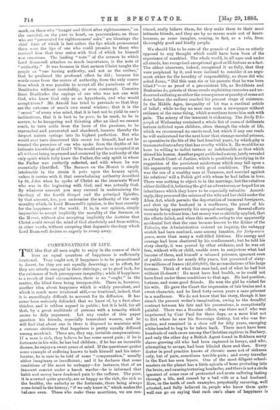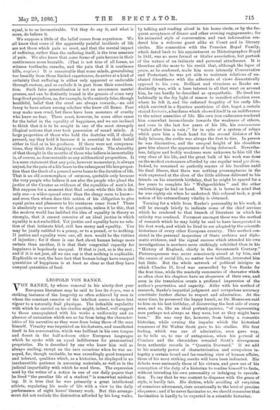COMPENSATIONS IN LIFE.
THE idea that all men ought to enjoy in the course of their lives an equal quantum of happiness is sufficiently irrational. They ought not, if happiness is to be proportioned to desert, for they are not equally deserving; or to effort, for they are utterly unequal in their strivings ; or to good luck, for the existence of luck presupposes inequality ; while if happiness is a result of dead circumstance, there is no " ought " in the matter, the blind force being irresponsible. There is, however, another idea about happiness which is widely prevalent, and which is much more irrational still,—so irrational, indeed, that it is exceedingly difficult to account for its diffusion. It has never been seriously defended, that we know of, by a first-class thinker, and is seldom argued in public ; but it is held, for all that, by a great multitude of persons with a tenacity which seems to defy argument. Let any reader of this paper question his friends, especially benevolent women, and he will find that about one in three is disposed to maintain with a curious obstinacy that happiness is pretty equally diffused among mankind. Theie are, they say, invisible compensations. If a man is rich, they believe he has some secret pain ; if he is fortunate in his wife, he has bad children ; if he has an incurable disease, he enjoys a sweet peace of mind. If the questioner quotes some example of suffering known to both himself and his inter- locutor, he is sure to be told of some "compensation," usually either imaginary or insufficient ; and if he declares that some conditions of life must be unhappy—for instance, that of an innocent convict under a harsh warder—he is informed that habit and mercy have deadened pain to the sufferer. The poor, it is asserted quite gravely, are as happy as the rich, the sick as the healthy, the unlucky as the fortunate, there being always some detail in the history, "if we only knew it," which makes the balance even. Those who make these assertions, we are con-
vinced, really believe them, for they make them to their most intimate friends, and they are by no means made out of heart- lessness, as some imagine, coming, in fact, as a rule, from thoroughly good and kindly people.
We should like to be sure of the genesis of an idea so utterly opposed to any thought which could have been born of the experience of mankind. The whole world, in all ages and under all creeds, has recognised exceptional good or ill-fortune as a fact. The oldest observers, indeed, recognised it so fully, that they were perplexed by it, and were inclined to consider it an argu- ment either for the heredity of responsibility, as those did who asked Jesus, "Did this man sin or his parents that he was born blind ?"—or as proof of a pre-existent life, as Buddhists and Brahmins do, priests of those creeds explaining excessive and un- deserved suffering as either the consequence or penalty of some act done before the sufferer reached his present stage of existence. In the Middle Ages, inequality of lot was a cardinal article of belief; while to-day no man can open a newspaper without evidence of the same thing, which sometimes turns him sick with pain. The misery of the innocent is sickening. The Daily Tele- graph of Wednesday contained a whole list of cases of deliberate torture inflicted upon children, often through the whole of life, which we recommend no one to read, but which if any one reads he will understand for the next hour that strange mental process, so operative in the life of the last hundred years, by which pity is transmuted into a fury that has cruelty within it. He would for an hour be willing to inflict torture as indefensible as that which stirred his horror. Another paper published a story, lately revealed. in a French Court of Justice, which is positively horrifying in its suggestion of the persistent misfortune which may fall upon a life apparently surrounded with good conditions. The victim was the son of a wealthy man at Tarascon, and married against his relatives' will a Polish girl with whom he had fallen in love. There was nothing to object to in the marriage, but the relatives either disliked it, believing the girl an adventuress, or hoped for an inheritance which they knew to be especially valuable. Accord- ingly, they procured the seizure of the wife and her child under the Alien Act, which permits the deportation of immoral foreigners, and shut up the husband in a madhouse, the proof of his insanity being apparently his unequal marriage. Several efforts were made to release him; but money was so skilfully applied, that the efforts failed, and when this month, owing to the apparently accidental fact that the case became known to the Editor of the Voltaire, the Administration ordered an inquiry, the unhappy wretch had been confined, sane among lunatics, for forty-seven years, more than many a well-filled lifetime. His energy and courage had been shattered by hi confinement ; but he told. his story clearly, it was proved by other evidence, and he was set free, without wife or child, unable even to conjecture what had. become of them, and himself a released prisoner, ignorant even of public events for nearly fifty years, but possessed of sixty- five millions of francs (L42,600,000), the accumulations of his large fortune. Think of what that man had, and of what he had lost without ill-desert ! He must have had health, or he could not have lived under those conditions to that age. He had position, fortune, and some good friends. He won the girl he wished for his wife. He gave the Court the impression of fair brains and a sweet character, and he lived forty-seven years a sane prisoner in a madhouse. We do not know that his story, though it has struck the present writer's imagination, owing to the dreadful contrast between his fate and his possessions, is exceptionally painful. There was a Russian officer, was there not? who was imprisoned by Czar Paul for three days, as a mere hint not to flirt where he saw his Sovereign flirting, but who was for- gotten, and remained in a close cell for fifty years, emerging white-headed to beg to be taken back. There must have been hundreds of such cases among the Christian captives in Barbary, and only the other day a British Agent found in Bokhara many slaves growing old who had been captured in forays, and who, attempting to escape, had been blinded there and then. Every doctor in good practice knows of chronic cases not of sickness only, but of pain, sometimes terrible pain ; and every traveller in the East has seen lepers. One of the most diligent school- masters on the planet has a little spicule of bone protuding into the brain, and causing torturing headache; and there is not a circle ignorant of some case of protracted and. acute suffering lasting through a life, and. caused by a bad wife or a bad husband. How, in the teeth of such examples, perpetually recurring, well attested, and fully believed in, people who know them quite well can go on saying that each one's share of happiness is
equal, is to us inconceivable. Yet they do say it, and what is more, do believe it.
We suppose a little of the belief comes from experience. We all know that some of the apparently painful incidents of life are not those which pain us most, and that the mental impact of suffering, rather than the suffering itself, is the true measure of pain. We also know that some forms of pain become in their continuance more bearable. (That is not true of all forms, as witness toothache, earache, and the pain that if it continues kills, angina.) It is conceivable that some minds, generalising too broadly from those limited experiences, do arrive at a kind of certainty that suffering is either only apparent or endurable through custom, and so exclude it in part from their considera- tion. Such false generalisation is not an uncommon mental process, and can be distinctly traced in the genesis of some very long-lived prejudices, as, for example, in the entirely false, though healthful, belief that the cruel are always cowards,—an odd fancy to have arisen among scholars who knew old Rome. Fear may make men cruel, but there have been monsters of cruelty who knew no fear. There must, however, be some other cause for the belief in the equality of happiness, and we are inclined to think that it is to be sought in one of the most strangely illogical notions that ever took possession of sound minds. A large proportion of those who hold the doctrine will, if closely pressed, say they hold it because it is essential to their belief either in God or in his goodness. If there were not compensa- tions, they think the Almighty would be unfair. The absurdity of that thought in the mouths of those who believe in immortality is, of course, as demonstrable as any arithmetical proposition. It is a mere statement that any pain, however momentary, is always unjust, for the pain of a life bears to the subsequent life less propor- tion than the throb of a pressed nerve bears to the duration of life. That is an old commonplace of sermons, quotable only because the very people who believe it are also the people who plead the justice of the Creator as evidence of the equalities of men's lot. But suppose for a moment that God exists while this life is the only one—a wider-spread error than the clergy seem to know— and even then where does this notion of his obligation to give equal pains and pleasures to his creatures come from P There is absolutely no answer to that question, unless it be this, that the modern world has imbibed the idea of equality in theory so strongly, that it cannot conceive of an ideal justice in which equality is not embedded. Yet justice and equality have no rela- tion of that intimate kind, still less mercy and equality. You may be justly entitled to a penny, or to a pound, or to nothing. If justice and equality were one, all men would be the victims of injustice ; for if there is one fact about human beings more certain than another, it is that their congenital capacity for happiness is hopelessly unequal. If that is just, so is the rest ; and if it is not just, all we can say is that nothing is explicable. Explicable or not, the bare fact that human beings have unequal quantities of happiness is at least as clear as that they have unequal quantities of food.



































 Previous page
Previous page